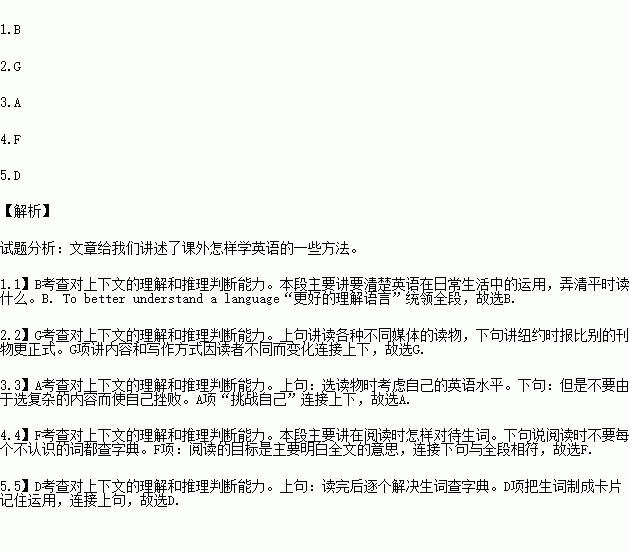题目内容
根据短文内容,从短文后的选项中选出能填入空白处的最佳选项,并在答题卡上将该项涂黑。选项中有两项为多余选项。
(请将答案涂在答题卡上E=AB F=AC G=AD)
Learning English can be a difficult task. While many people learn English in the classroom, the vast majority of English learning takes place outside of it.
1. , it is important to know how it is used in everyday life. One of the best things you can do is to read. First ask yourself what you enjoy reading in your native language. If the subject matter is interesting to you, you will be more likely to keep going. Read a variety of different media in English, from magazines to novels. 2. . New York Times takes a more formal approach to the English language than somebody's personal blog.
Consider your English level when selecting reading material. 3. , but do not frustrate yourself needlessly by selecting a complex text . You can choose to be a side-by-side reader, with the English text on one page and its translation on the other page, if you have only been studying English for a couple of years.
4. . So do not look up every word you don't know as you read. It will only slow things down and make the reading process much less fun. Instead, rely on what you have already known. When you come across a difficult word or phrase,use context clues to guess at its meaning. Write down or underline any words or phrases you cannot figure out. When you have finished reading, go to your list of new words. Now you can get your dictionary and look them up one by one. 5. . You will be more likely to keep reading the interesting subject.
A. Challenge yourself
B. To better understand a language
C. When you want to learn English, try New York Times
D. Turn them into flash cards, keep them in mind and use them
E. Putting a dictionary at hand is a good way of learning English
F. Your reading goal is to briefly understand what the piece is saying
G. The content and writing styles vary with the group of readers
 快乐5加2金卷系列答案
快乐5加2金卷系列答案Time | Event | Location | Audience |
10:15 a.m. on Wednesday | BABY_AND_ME Babies from birth to 18 months old and their parents/caregivers can enjoy great books, lively songs, and rhymes, and meet other babies in the neighborhood. This program is limited to 35 participants. | Muhlenberg Library, Community Room | Children, Infant (0-18 months) |
10:30 a.m. on Wednesday | OPEN_LAB Are you having trouble with your email? Don’t know how to cut and paste? Never touched a computer? This is the time and place for you to get ahead with 21st century technology! Bring your technology questions and/or your wireless enabled device and get one?on?one assistance, discover online tutorials, improve your skills, exceed the limits of your imagination! | St. George Library Center, TechConnect Lab | Adults |
10 a.m. on Thursday | I_NEED_A_DOCTOR:_HEALTH_INFO_ONLINE Learn to find consumer health information online, including doctors’ credentials, hospital information, drug side effects, conventional and alternative medical treatments of diseases, diets, weight loss, nutrition and exercises, and how to evaluate these websites. | Kips Bay Library | Adults |
12 noon on Thursdays | No talking, no cell phone, and no noise are required in our quiet study room. This room is open thanks to our volunteers, and is subject to their availability. If you are interested in keeping the quiet study room open more hours, please see a staff member about becoming a volunteer! Quiet Study Hours: Mondays 12-5, Tuesdays 1-5, Wednesdays 1-5, Thursdays 12-5, Fridays 10-3, Saturdays 10-3. Subject to cancellation /change of hours without prior notice. | 67th Street Library | 50+, Book Lovers, Business? people |
1.Who will probably take part in the event “BABY AND ME”?
A. Book lovers. B. Businessmen.
C. Infants. D. Adults 50+.
2.Where will you go if you want to learn about computer technology?
A. Muhlenberg Library. B. St. George Library Center.
C. Kips Bay Library. D. 67th Street Library.
3.In which event can you work as a volunteer?
A. BABY AND ME.
B. OPEN LAB.
C. I NEED A DOCTOR: HEALTH INFO ONLINE.
D. QUIET STUDY ROOM.
Welcome to the Electronic (电子设备的) Village to find new ways of language teaching and learning.
Electronic Village Program (Thursday, June 18, 2015) | |
Nearpod ? 9:00 am to 10:00 am ? Room 501 Nearpod is a software program that creates a rich context (语境) for students to learn vocabulary. The worker will show how to use it. | TEO ? 2:00 pm to 3:00 pm ? Room 502 Our students come from different backgrounds but they all want to learn on-line. The presenter will use examples from his first on-line class to explain how any teacher can begin teaching on-line with TEO. |
Kahoot ? 10:30 am to 11:30 am ? Room 601 Kahoot software can be used to create grammar tests which can be graded on a network. It can provide students with feedback (反馈). | Prezi ? 3:30 pm to 4:20 pm ? Room 602 Uses of Prezi in listening and speaking courses attract students' attention to speaking more fluently. The worker will show how students speak fluently on many topics, including introducing family, friends, and hobbies. |
1.Nearpod can be used to ______.
A. offer grammar tests
B. teach listening on-line
C. help vocabulary learning
D. gain fluency in speaking
2. If you want to improve your speaking skills, you can go to____________.
A. Room 501 B. Room 502 C. Room 601 D. Room 602
3. Which of the following can assess(评估) your grammar learning?
A. Nearpod B. Kahoot C. TEO D. Prezi
4. A teacher who wants to learn on-line teaching is expected to arrive by ______.
A. 9:00 am B. 10:30 am
C. 2:00 pm D. 3:30 pm

